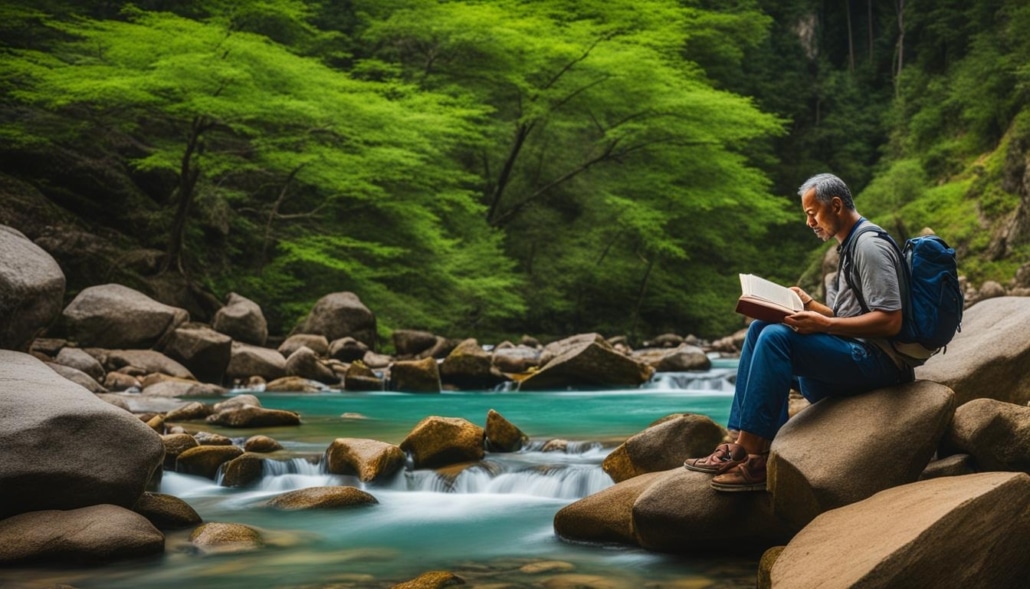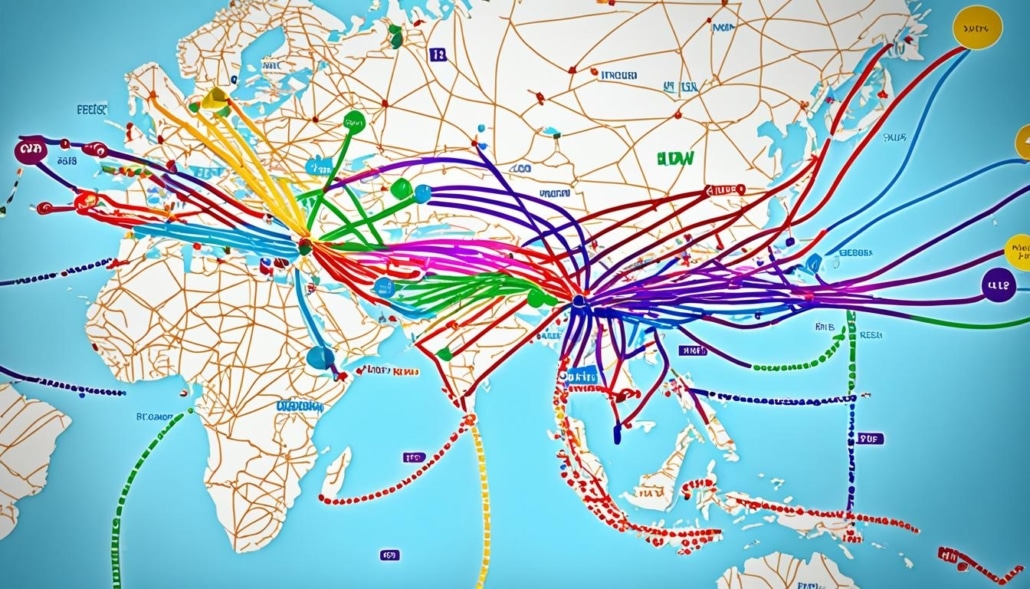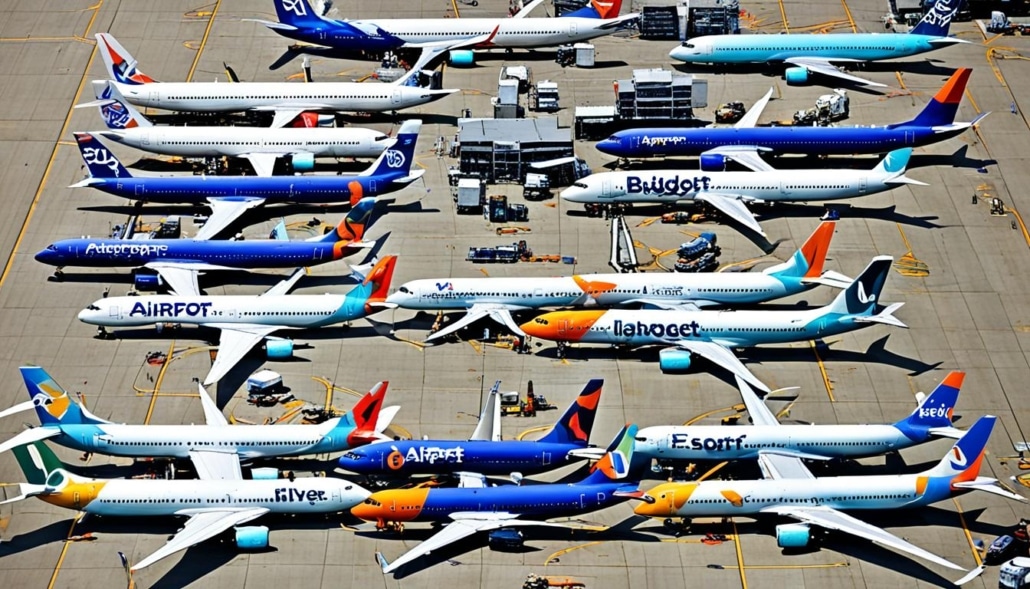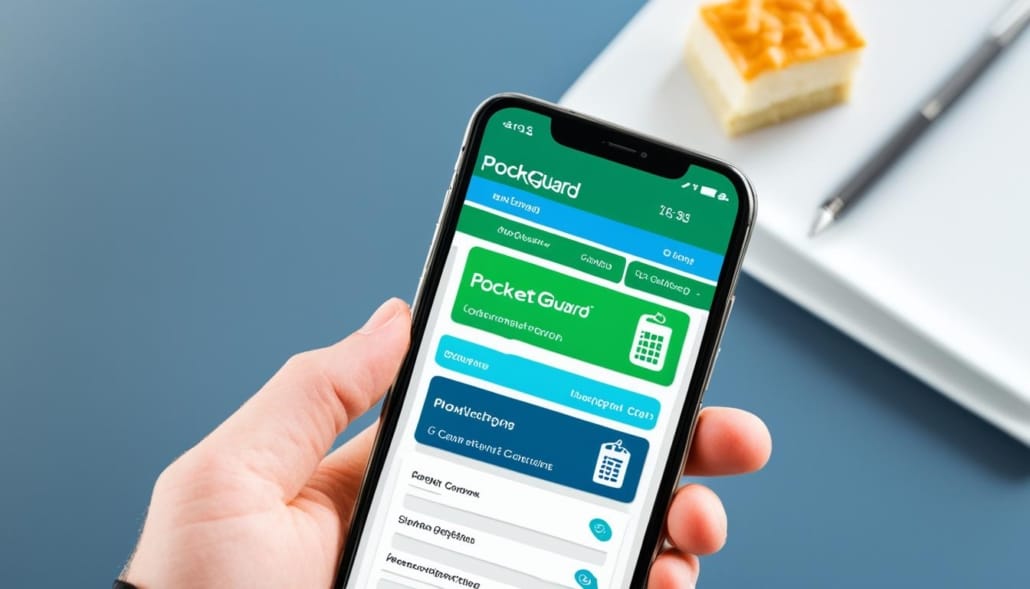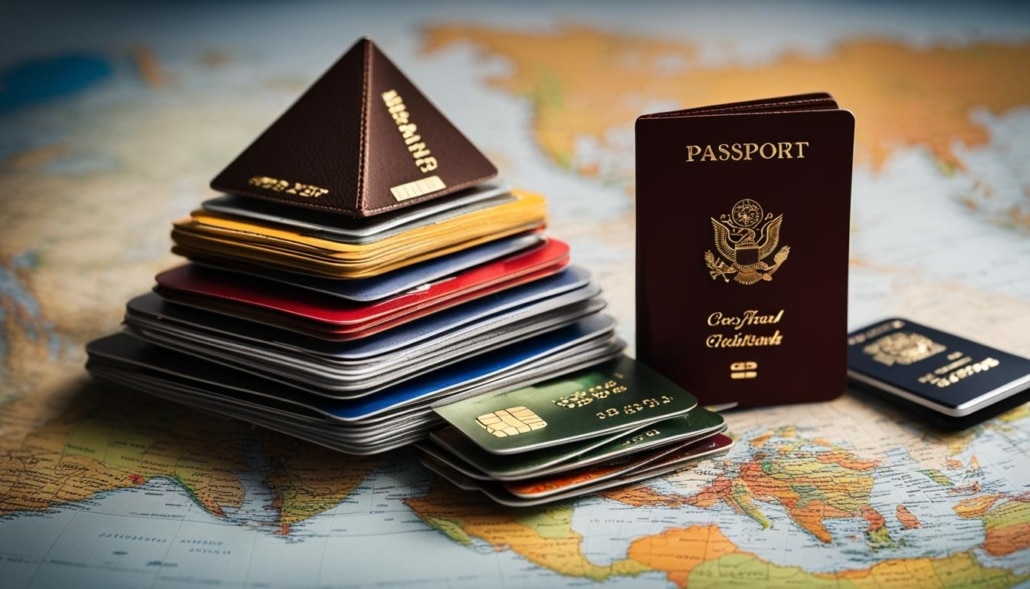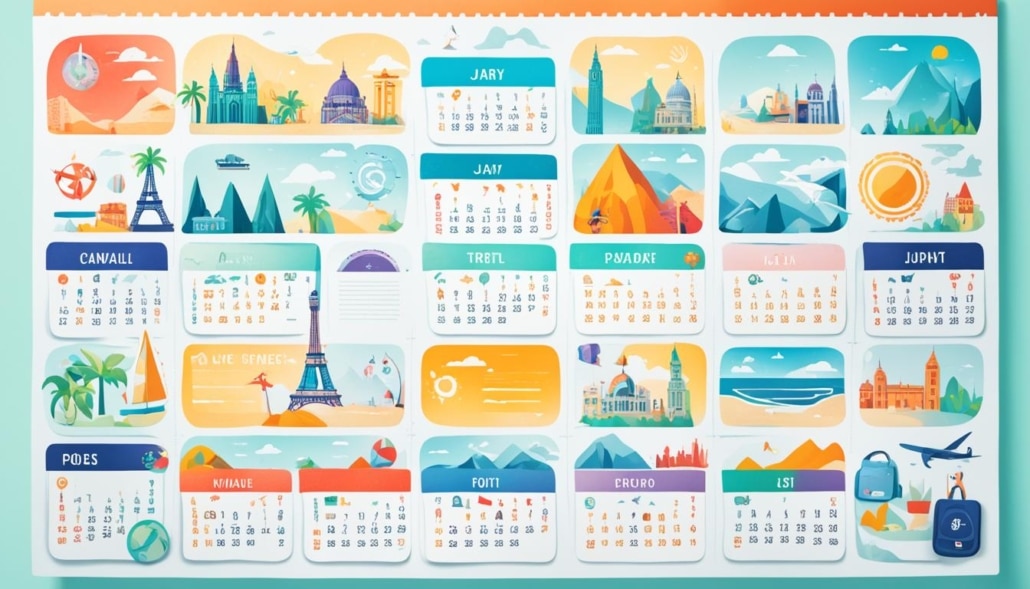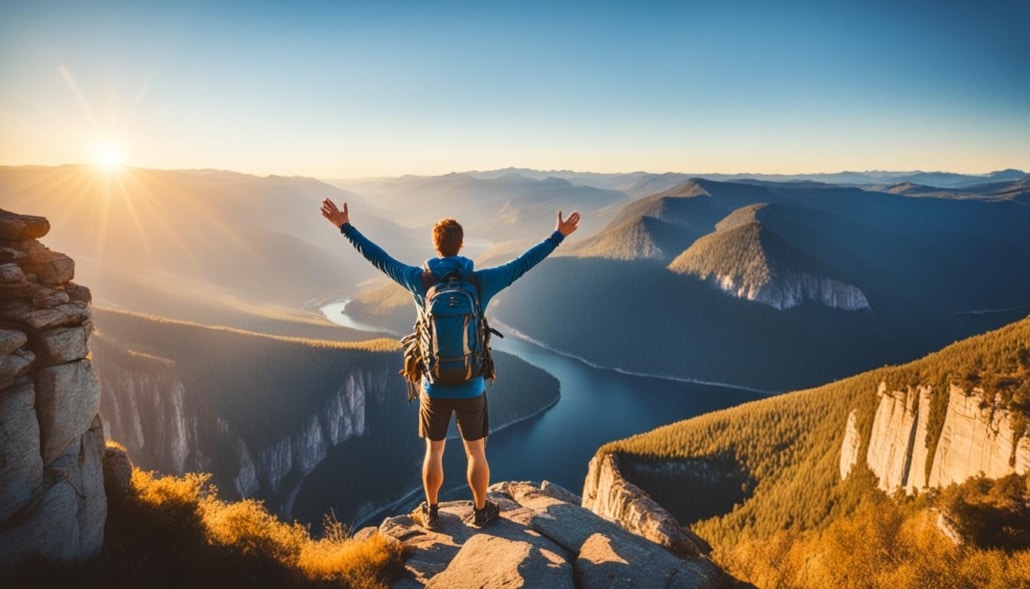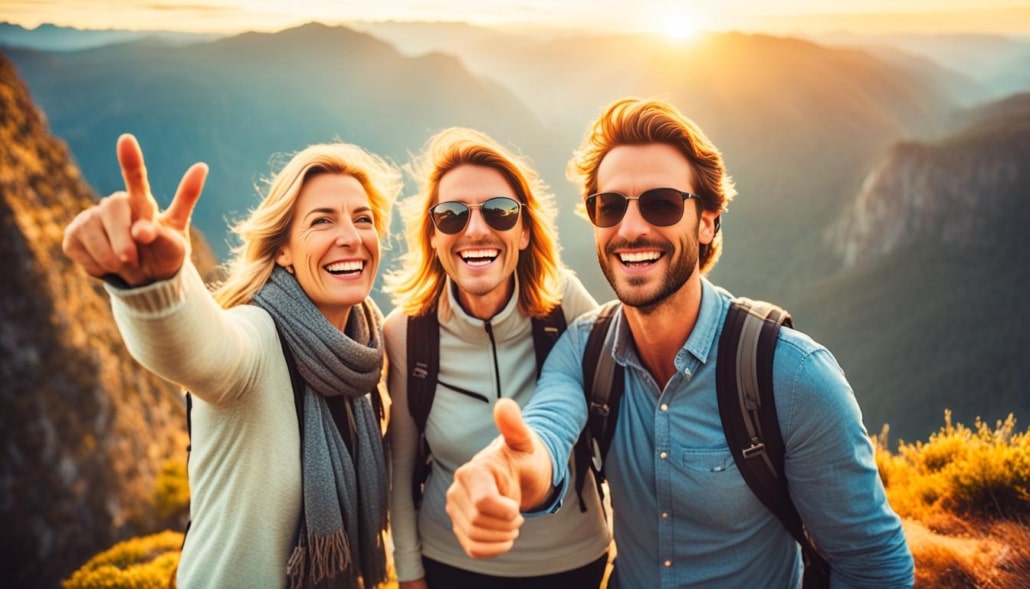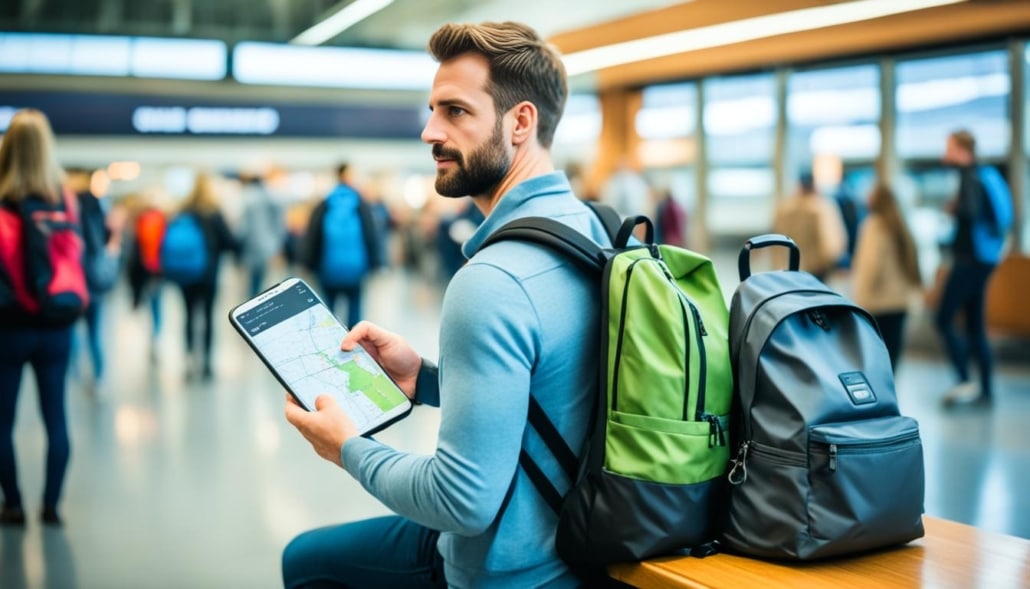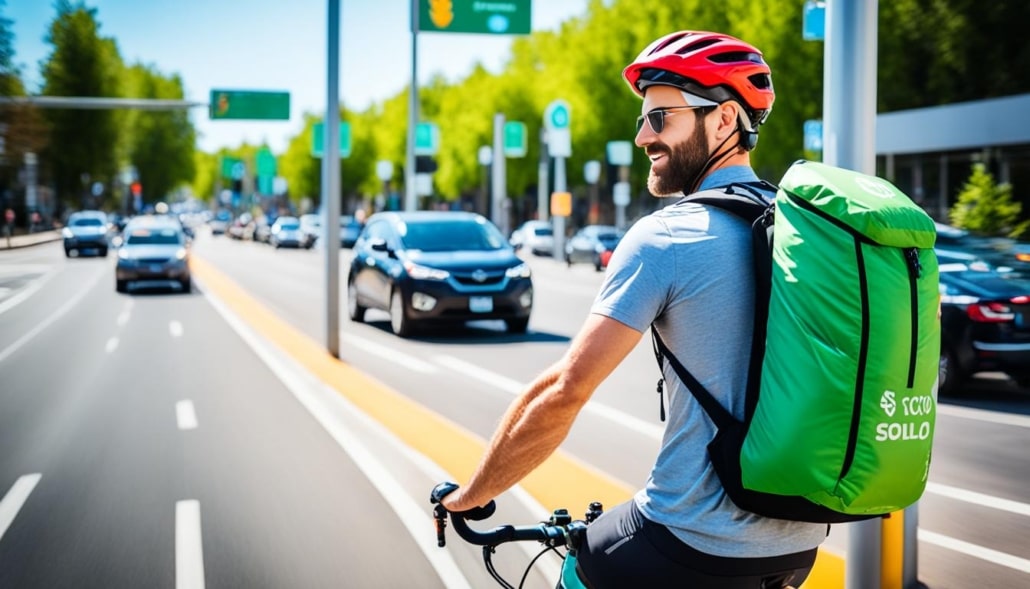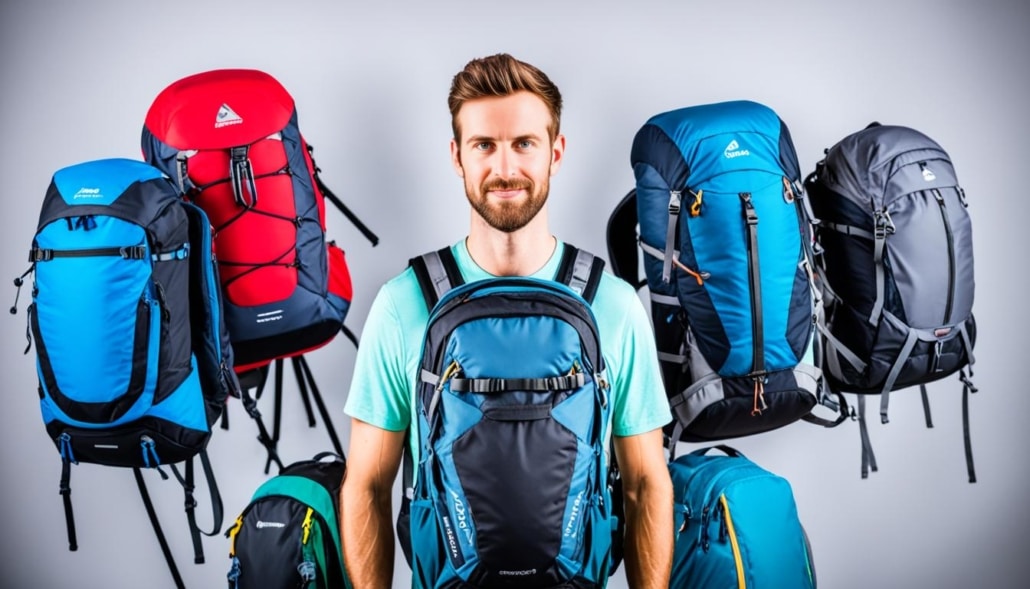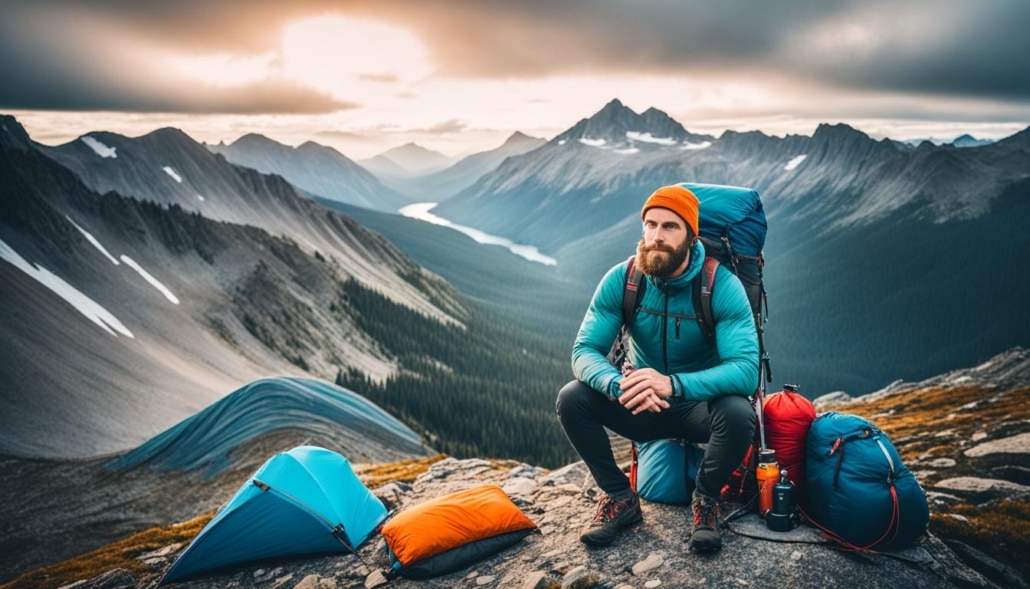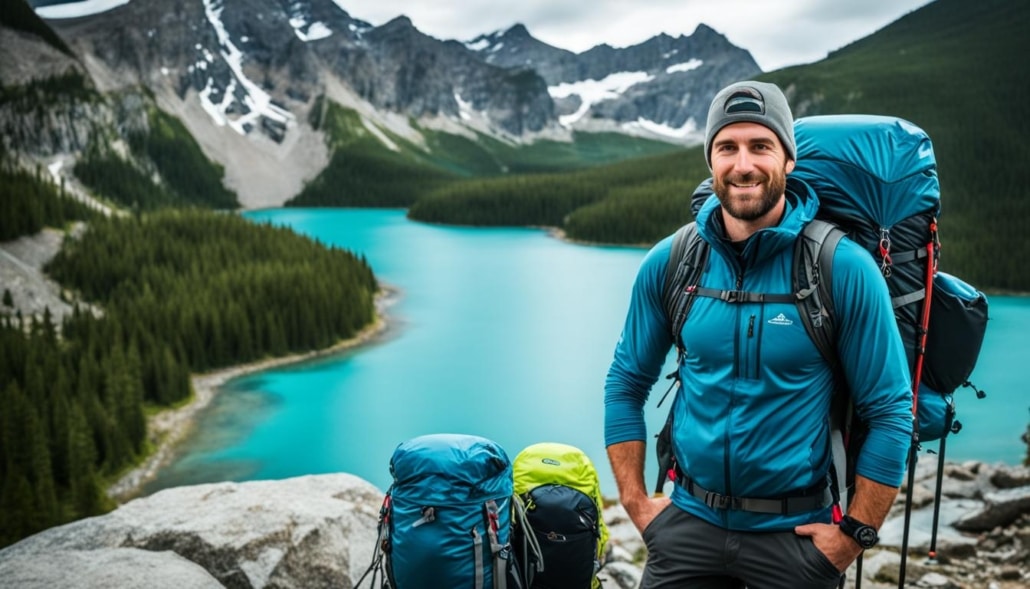Traveling sustainably has become increasingly important as the effects of climate change continue to worsen. We can reduce our carbon footprint and minimize our environmental impact by adopting sustainable travel practices. This article will provide you with 10 useful tips for sustainable travel. Whether you’re a seasoned traveler or planning your first adventure, these tips will help you explore the world in an eco-friendly and responsible way.
Key Takeaways:
- Eco tourism is crucial for minimizing our impact on the environment.
- Green travel tips can help us reduce our carbon footprint.
- Embracing eco-friendly practices while traveling is vital for responsible tourism.
- By adopting sustainable practices, we can protect the planet and support local communities.
- Traveling sustainably allows us to explore the world responsibly and leave a positive impact on the places we visit.
Pre-Shop for Ecofriendly Travel Items
Prepare for an eco-friendly journey by pre-shopping for sustainable travel items that can help reduce waste and minimize your environmental impact. By choosing zero waste products and reusable items, you can ensure that you’re making conscious choices while on the go.
One essential item to have in your eco-travel kit is a reusable water bottle. Opt for a stainless steel or glass bottle that you can refill wherever you go, reducing the need for single-use plastic bottles. It’s a small but meaningful way to cut down on plastic waste and protect the environment.
When it comes to choosing footwear for your travels, consider sustainable sneakers made from recycled materials or ethical fabric. These sneakers not only provide comfort and style but also contribute to reducing waste by repurposing materials that would otherwise end up in landfills. Additionally, opt for ethical sandals made from vegan leather or natural fibers, supporting brands that prioritize sustainability and ethical practices.
Another important aspect of eco-friendly travel is having the right camping gear. Look for eco-friendly camping gear that is made from sustainable materials and designed with the environment in mind. From eco-friendly tents to biodegradable camping utensils, there are plenty of options available to help you minimize your impact while enjoying the great outdoors.
Don’t forget to pack eco-friendly toiletries for your journey. Choose reusable items such as makeup pads instead of disposable cotton pads. Consider toothpaste tabs, which eliminate the need for plastic tubes, and opt for bar soaps instead of single-use plastic bottles. These eco-friendly toiletries not only reduce waste but also support brands that prioritize sustainability.
Key Points:
– Pre-shop for eco-friendly travel items to reduce waste and minimize your environmental impact.
– Choose a reusable water bottle to reduce single-use plastic waste.
– Opt for sustainable sneakers made from recycled materials or ethical fabric.
– Select ethical sandals made from vegan leather or natural fibers.
– Look for eco-friendly camping gear made from sustainable materials.
– Pack eco-friendly toiletries such as reusable makeup pads, toothpaste tabs, and bar soaps.
Travel with Slow Intention
When it comes to exploring new destinations, embracing slow travel can be a transformative experience. Slow travel involves immersing yourself in the local culture for an extended period, allowing you to engage more deeply with your surroundings, reduce your carbon footprint, and support local businesses.
By taking the time to truly connect with a place, you can learn the language, savor the local cuisine, and participate in cultural activities that are often missed by fast-paced itineraries. Whether you’re wandering through vibrant local markets, attending traditional festivals, or exploring hidden gems known only to the locals, slow travel allows for a richer and more authentic travel experience.
Consider extending your stay in a destination to build meaningful connections with the locals. This could involve renting a home or participating in a work exchange program that allows you to contribute to the local community while immersing yourself in the local way of life. By embracing a slower pace, you can gain a deeper understanding of the local culture and make a positive impact.
Choosing eco-friendly accommodations, such as eco-stays, further enhances your slow travel experience. These accommodations prioritize sustainable practices, minimizing their impact on the environment while also supporting the local economy. By opting for eco-stays, you contribute to the preservation of the destination’s natural beauty and cultural heritage.
Remember, slow travel is not just about the destination; it’s about the journey itself. Take the time to appreciate the little moments, the interactions with locals, and the opportunity to engage with a culture different from your own. Slow down, immerse yourself, and embrace the transformative power of travel.
As you embark on your next adventure, consider the joy of slow travel and the meaningful connections it can bring. By immersing yourself in the local culture, extending your stays, and engaging with the community, you can support local businesses and create lasting memories. Slow travel is not merely a way to see the world; it is a way to experience it, leaving a positive impact on both the places you visit and your own life.
Support Sustainable Accommodations
When it comes to sustainable travel, choosing the right accommodations can have a significant impact on reducing your environmental footprint. Opting for eco-conscious accommodations not only allows you to enjoy a comfortable stay but also supports the preservation of our planet. There are several platforms that specialize in connecting travelers with sustainable accommodations, such as Ecobnb, Bookitdifferent, and Wayaj. These platforms provide an extensive selection of eco-friendly options that prioritize energy efficiency, waste reduction, and water conservation.
By booking through these platforms, you can be confident that your host or accommodation provider is dedicated to sustainable practices. Many of these properties implement energy-efficient technologies, such as solar panels and energy-saving appliances, to minimize their carbon footprint. They also focus on waste reduction by implementing recycling programs and composting initiatives. Water conservation is another key aspect, with accommodations often utilizing water-saving fixtures and encouraging guests to use water responsibly.
For those looking for budget-friendly options that align with sustainability values, homestays and couchsurfing are excellent choices. These accommodations not only offer unique cultural experiences but also allow travelers to establish connections with local communities. By staying with locals, you can enjoy cultural exchanges, gain insider knowledge, and contribute to the well-being of your host and their community.
Prioritizing Community and Environmental Contributions
When selecting your accommodations, it is essential to consider hosts who actively contribute to their communities’ well-being and environmental preservation. Some hosts engage in initiatives that benefit the local economy and promote sustainable development. From supporting local artisans to organizing community events, these accommodations go beyond providing a place to stay and have a positive impact on the destinations they call home.
Choosing sustainable accommodations is a small but impactful step towards responsible travel. Not only can you have a memorable experience, but you can also contribute to the global effort of preserving our planet for future generations.
| Benefits of Sustainable Accommodations |
|---|
| Promote energy efficiency through the use of renewable resources |
| Reduce waste by implementing recycling and composting programs |
| Conserve water with water-saving fixtures and responsible water usage |
| Support local communities and cultural preservation |
| Establish connections with locals for authentic cultural experiences |
By making conscious choices in your travel accommodations, you are actively contributing to a more sustainable and eco-conscious future.
Support Local Businesses for Lasting Impact
One of the most impactful ways to promote sustainable development and preserve cultural diversity is by supporting local businesses. When you shop locally and choose handmade items, you not only contribute to the local economy but also create job opportunities and income for the community.
By purchasing traditional crafts, you help sustain heritage and keep cultural diversity alive. These unique handmade items often hold deep cultural significance and are crafted with passion and skill, making them truly special.
Supporting local businesses also reduces reliance on external factors and promotes fairness and entrepreneurship. It empowers communities to become self-reliant and fosters economic resilience in the face of challenges.
When you choose to shop locally and buy handmade items, you play a vital role in sustainable development. Your conscious choices contribute to reducing poverty and fostering economic stability in communities around the world.
Make a lasting impact by supporting local businesses and embracing the beauty of handmade items. Together, we can create a better future for both our planet and the people who call it home.
Support Eco-friendly Hotels
When choosing accommodations for your travels, consider staying at eco-friendly hotels that are committed to minimizing their environmental footprint. These hotels prioritize sustainability by implementing various practices such as energy and water conservation, waste reduction, and the elimination of single-use plastics. Supporting these eco-friendly hotels not only allows you to enjoy a comfortable stay but also contributes to the preservation of the environment and the promotion of responsible tourism.
Many eco-friendly hotels go the extra mile to showcase their commitment to sustainability by obtaining relevant certifications. These certifications provide assurance that the hotel has met specific environmental standards and practices. By opting for hotels with sustainability certifications, you can have peace of mind knowing that your stay aligns with your eco-friendly values and supports businesses that prioritize environmental responsibility.
When searching for eco-friendly hotels, look for those that prioritize key practices such as:
- Energy and water conservation: Through the use of energy-efficient appliances, renewable energy sources, and water-saving measures, these hotels minimize their consumption and impact on natural resources.
- Waste reduction: Implementing waste management strategies such as recycling, composting, and reducing packaging waste helps these hotels minimize the amount of waste sent to landfills.
- Avoiding single-use plastics: By offering reusable alternatives and eliminating single-use plastics, eco-friendly hotels help mitigate the harmful effects of plastic pollution on the environment.
Choosing eco-friendly hotels not only supports sustainability but also contributes to the well-being of local communities. These hotels often engage in community initiatives, support local businesses, and prioritize the social and economic development of the areas they operate in.
Benefits of Staying at Eco-friendly Hotels
Staying at eco-friendly hotels offers several benefits, including:
- Reducing your environmental impact: By staying at hotels that prioritize sustainability, you can minimize your carbon footprint and contribute to the global effort to combat climate change.
- Supporting responsible tourism: Eco-friendly hotels play a crucial role in promoting responsible travel practices and raising awareness about the importance of preserving the environment.
When booking your next accommodation, make a conscious choice to support eco-friendly hotels. By doing so, you can enjoy a comfortable stay while knowing that your travel choices are aligned with your values and positively impacting the environment.
| Benefits of Staying at Eco-friendly Hotels |
|---|
| Reduced environmental impact |
| Support for responsible tourism |
Book Local Travel Guides & Tours
Discover a destination authentically by booking local travel guides and tours. Opting for local guides not only enhances your travel experience but also supports the local economy, preserves culture, and keeps money within the community. These knowledgeable guides offer insider expertise, sharing history, traditions, and hidden gems that you might not discover on your own. They can take you off the beaten path and provide a deeper understanding of the local culture.
Choosing local tour operators directly benefits the community by creating jobs and preserving cultural identity. These operators are deeply rooted in the destination and have a vested interest in its preservation and sustainability. By prioritizing local tour operators, you contribute to responsible tourism that values cultural preservation and environmental conservation.
Why Book Local Guides and Operators?
“Booking local guides and operators allows you to connect with the heart and soul of a destination. They provide invaluable insights, showcasing the authentic essence of the place. Supporting local guides and operators not only enriches your travel experience but also creates a positive impact on the local community.”
– Emily Davis, Sustainable Travel Expert
By booking local travel guides and tours, you contribute to responsible tourism that supports the local economy, preserves cultural heritage, and fosters a sense of community. Your choice empowers local communities, creates job opportunities, and ensures a sustainable future for the destination.
Table: Comparison of Local Travel Guides vs. Mainstream Tourist Guides
| Local Travel Guides | Mainstream Tourist Guides |
|---|---|
| Insider expertise and local knowledge | Generic information targeted at a broad audience |
| Deep cultural insights and hidden gems | Highlighting popular tourist attractions |
| Supporting the local economy | Benefiting large tourist companies |
| Preserving cultural heritage | Overcrowding and potential cultural erosion |
| Environmentally conscious approach | Mass tourism impact on the environment |
Conclusion
Sustainable travel is essential in today’s world, as we strive for a better future. As conscious travelers, we have the power to minimize our impact on the environment while supporting local communities. By adopting eco-friendly practices, choosing sustainable accommodations, supporting local businesses, and embracing slow travel, we can fulfill our wanderlust responsibly.
Eco tourism is a way of exploring the world that emphasizes the preservation of natural resources and cultural heritage. By making sustainable choices, we can protect the planet and leave a positive impact on the places we visit. From pre-shopping for eco-friendly travel items to booking local guides and tours, every decision we make can contribute to the well-being of the environment and local communities.
Let’s commit to being conscious travelers and making a difference. Together, we can create a more sustainable and responsible travel industry. By prioritizing the principles of eco tourism, we not only benefit the places we visit but also ensure that future generations can experience the beauty of our planet. Embrace sustainable travel practices and become an advocate for conscious travel, for the sake of our world and the well-being of all.
FAQ
What are some eco-friendly travel items to pack?
Some eco-friendly travel items to pack include a reusable water bottle, bamboo or stainless steel cutlery, leak-proof food containers, recycled material sneakers or ethical fabric footwear, and vegan leather or natural fiber sandals. Additionally, green toiletries such as reusable makeup pads, toothpaste tabs, and bar soaps can help reduce single-use packaging and plastic waste.
What is slow travel and how can it be practiced?
Slow travel involves immersing yourself in the local culture for an extended time, reducing your carbon footprint, and supporting local businesses. You can practice slow travel by engaging deeply with the culture, learning the language, enjoying local food, participating in activities, and extending your stay to build local connections. Consider volunteering or participating in work exchange programs to contribute to the community.
How can I find sustainable accommodations?
You can find sustainable accommodations by utilizing platforms such as Ecobnb, Bookitdifferent, and Wayaj, which promote energy efficiency, waste reduction, and water conservation. Additionally, consider budget-friendly options like homestays and couchsurfing, as they support locals and offer cultural exchanges. Prioritize accommodations that contribute to their communities’ well-being and environmental preservation.
How can I support local businesses while traveling?
You can support local businesses by shopping locally and choosing handmade items. Your purchases provide job opportunities and income to locals, supporting their livelihoods and families. Buying traditional crafts also helps sustain cultural heritage and diversity. Additionally, preferring local businesses over external factors promotes fairness, entrepreneurship, sustainable development, poverty reduction, and economic resilience.
What should I look for in eco-friendly hotels?
When choosing eco-friendly hotels, prioritize those that minimize their environmental footprint through energy and water conservation, waste reduction, and avoidance of single-use plastics. Many hotels hold sustainability certifications to showcase their commitment to the planet. Opting for these hotels supports sustainability, preserves the environment, and promotes responsible tourism. Look for hotels that prioritize eco-friendly practices and contribute to their communities’ well-being.
How can I book local travel guides and tours?
You can book local travel guides and tours to discover a destination authentically and support the local economy. Opting for local guides sustains livelihoods, preserves culture, and keeps money within the community. Local guides offer unique insights, sharing history, traditions, and hidden gems. Similarly, choosing local tour operators directly benefits the community, creating jobs and preserving cultural identity. Prioritize operators aligned with sustainability and responsible tourism, contributing positively to the environment and local communities.
Why is sustainable travel important?
Sustainable travel is important as it allows us to minimize our impact on the environment and support local communities. By adopting eco-friendly practices, choosing sustainable accommodations, supporting local businesses, and embracing slow travel, we can protect the planet while satisfying our wanderlust. Traveling sustainably enables us to explore the world responsibly and leave a positive impact on the places we visit. Let’s commit to making sustainable choices and becoming conscious travelers for a better future for all.

